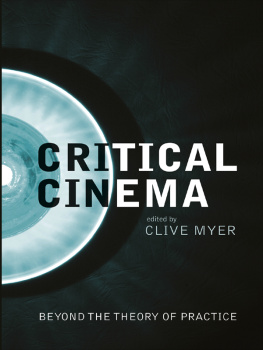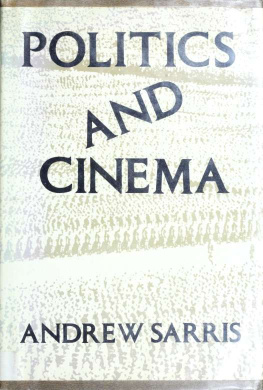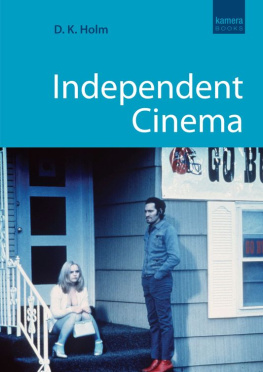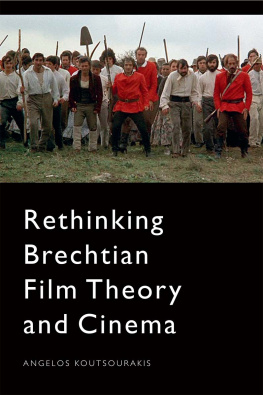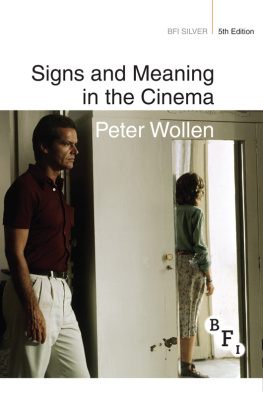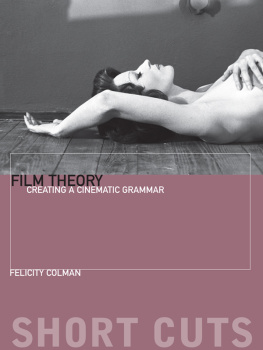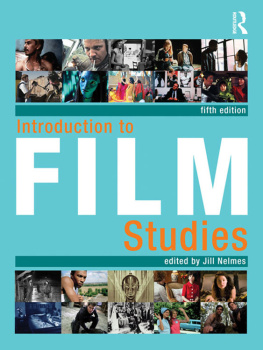CRITICAL CINEMA
CRITICAL CINEMA
BEYOND THE THEORY OF PRACTICE
edited by Clive Myer
with a foreword by Bill Nichols
FOR LYNDA
Above the sea
a rainbow, erased by
a flock of swallows
TAKARAI KIKAKU (16611707)
A Wallflower Book
Published by
Columbia University Press
Publishers Since 1893
New York Chichester, West Sussex
cup.columbia.edu
Copyright Clive Myer 2011
All rights reserved.
E-ISBN 978-0-231-50456-0
A complete CIP record is available from the Library of Congress
ISBN 978-1-906660-37-6 (cloth. : alk. paper)
ISBN 978-1-906660-36-9 (pbk. : alk. paper)
ISBN 978-0-231-50456-0 (e-book)
Book design by Elsa Mathern
A Columbia University Press E-book.
CUP would be pleased to hear about your reading experience with this e-book at .
CONTENTS
This book is indebted to all those filmmakers, film tutors and film students who care about the relationship between theory and practice and who have an inkling that the way, what, where, how and why we make films interlinks with the way we live our lives and the values we bring to them.
I would like to thank colleagues who gave papers and presentations at the inaugural conference of the Film Academy in Cardiff in 2003 BEYOND the Theory of Practice and who inspired this book: John Adams, Joan Ashworth, Desmond Bell, Dave Berry, Noel Burch, Richard Butt, Michael Chanan, Mary M. Dalton, Patrick Fuery, Coral Houtman, Brett Ingram, Igor Kori, Ian Macdonald, Laura Mulvey, Suzanne Regan, Angus Reid, Chris Rodrigues, Michele Ryan, Aparna Sharma, Michael Stewart, Rod Stoneman, David Surnam, Zuzana Gindi Tatrov, Ernie Tee, Clive Walley, Brian Winston, Peter Wollen, Jan Worth and Peter Wyeth, as well as those who attended the event over the three days. Special thanks to the Project Manager of the Film Academy Rebecca Davies.
My thanks also go to the conference sponsors CILECT (with special thanks to Igor Kori), NAHEMI (with special thanks to Yossi Bal), the British Academy, Berwyn Rowlands and his former colleagues at Sgrn (now the Film Agency for Wales) and the University of Glamorgan.
of this book began as component of a part-time PhD at the Royal College of Art between 2000 and 2008 and I would like to thank my supervisors A. L. Rees and Professor Jorem Ten Brink for their guidance as well as my external examiners Professors Michael Chanan and Desmond Bell for their perceptive comments. In particular I would like to thank my family; Lynda, Lucy, Mike, Barney, Dorothea and George who tolerated my absence while simultaneously making films, setting up film schools, writing a PhD and editing a book!
Special thanks to Martin OShaughnessy for the translation of Noel Burchs chapter Cinema, Theory, Women and to ditions lHarmattan in Paris for their permission to translate and publish the chapter. Special thanks also to Laura Mulvey and Aparna Sharma for their additional attention and supplementary referencing to Peter Wollens keynote speech chapter Theory and Practice which was first published by Intellect in the Journal of Media Practice 6:2 in 2005.
Finally, I would like to add that the notion of a Film Academy, doctoral research through film practice, is not a notion bound by one institution but one that can cross boundaries, geographically and conceptually. The idea that a film student may have two supervisors from two schools, one relating to the representation of the subject in film and one relating to the place of the subject in the social world, remains valid and indeed imperative and I look forward to a wealth of work to be developed at film schools and universities across the world.
Clive Myer is a filmmaker, producer and academic. He was founder director of three film schools: the International Film School Wales at the University of Wales Newport; the Film Academy at the University of Glamorgan; and the Skillset Screen Academy Wales (co-founder). He was Senior Lecturer in Communication Studies with special reference to film and television at the University of London Goldsmiths College. He initiated Ffresh, the student moving image festival of Wales and is a director of the Wales One World film festival. He graduated in film practice with an MA and PhD from the Royal College of Art.
Nol Burch is a filmmaker and theoretician. He was born in California and has lived and worked in Paris for over half a century. He taught film in the UK at the Royal College of Art and the Slade in the 1970s and after some years teaching film in universities in Paris and Lille has returned to writing and filmmaking. His books include Theory of Film Practice (1973), Life to Those Shadows (1990), La Drle de Guerre des Sexes (with Genevive Sellier, 1996) and De la Beaut des Latrines (2007). He is currently preparing a book on French TV movies with Genevive Sellier, and another on the libretti of eighteenth- and nineteenth-century French lyric theatre and has directed, with Allan Sekula, a feature-length documentary about the political economy of the sea The Forgotten Space (Special Orizzonte Jury Prize at The Venice Mostra, 2010).
Peter Wollen is Professor Emeritus, Film Studies at the University of California, Los Angeles and has previously taught at the University of Essex; at New York University; Columbia University, NY; Northwestern University, Illinois; and at the San Francisco State University, San Francisco. He is the author of Signs and Meaning in the Cinema (1972), Singin in the Rain (1992) and Paris Hollywood (2002), and has edited or contributed to several other books about film and film studies. He has also made a number of films with Laura Mulvey including Riddles of the Sphinx (1978) and Crystal Gazing (1982), as well as making documentaries for television. He also co-wrote with Mark Peploe, Antonionis film The Passenger (1975).
Laura Mulvey is Professor of Film and Media Studies at Birkbeck College, University of London. She is the author of: Visual and Other Pleasures (1989: expanded 2nd edn in 2009), Fetishism and Curiosity (1996), Citizen Kane (1996) and Death Twenty-four Times a Second: Stillness and the Moving Image (2006). She has made six films in collaboration with Peter Wollen including Riddles of the Sphinx (1978) and Frida Kahlo and Tina Modotti (1980).
Patrick Fuery is Professor and Chair of the Department of English at Chapman University, California. He was previously Professor of Film, Media and Cultural Studies at the University of Newcastle in Australia and Director of the ArtsHealth Research Centre as well as the Research Centre for Creativity, Technology and Culture. He is the author of eight books including: Madness and Cinema: Psychoanalysis, Culture and the Spectator (2004); Visual Cultures and Critical Theory (2003); New Developments in Film Theory (2000) and Cultural Studies and the New Humanities (1997). His forthcoming books are Medicine and the Arts: History and Contemporary Practices and Towards an Ethics of Disturbance.
Nico Baumbach is Assistant Professor of Film Studies at Columbia University, USA. He completed his PhD in Literature on the subject of cinema and pedagogy at Duke University in 2009 under the direction of Fredric Jameson and Jane Gaines. His recent work focuses on the relation between politics and aesthetics in documentary cinema and he is completing a book on the film theory of Badiou, Rancire, Agamben and iek.

